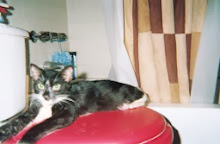Be sure to take the time to drop by Bibliophile By the Sea to read Diane's selection this week and the many other wonderful contributions from the participants in this meme.
St. Botolphs was an old place, an old river town. It had been an inland port in the great days of the Massachusetts sailing fleets and now it was left with a factory that manufactured table silver and a few other small industries. The natives did not consider that it had diminished much in size or importance, but the long roster of the Civil War dead, bolted to the cannon on the green, was a reminder of how populous the village had been in the 1860s. St. Botolphs would never muster as many soldiers again. The green was shaded by a few great elms and loosely enclosed by a square of store fronts. The Cartwright Block, which made the western wall of the square, had along the front of its second story a row of lancet windows, as delicate and reproachful as the windows of a church. Behind these windows were the offices of the Eastern Star, Dr. Bulstrode the dentist, the telephone company and the insurance agent. The smells of these offices -- the smell of dental preparations, floor oil, spittoons and coal gas -- mingled in the downstairs hallway like an aroma of the past. In a drilling autumn rain, in a world of much change, the green at St. Botolphs conveyed an impression of unusual permanence. On Independence Day in the morning, when the parade had begun to form, the place looked prosperous and festive.
The two Wapshot boys -- Moses and Coverly -- sat on a lawn on Water Street watching the floats arrive. The parade mixed spiritual and commercial themes freely and near the Spirit of '76 was an old delivery wagon with a sign saying: GET YOUR FRESH FISH FROM MR. HIRAM. The wheels of the wagon, the wheels of every vehicle in the parade were decorated with red, white and blue crepe paper and there was bunting everywhere. The front of the Cartwright Block was festooned with bunting. It hung in folds over the front of the bank and floated from all the trucks and wagons.
The Wapshot boys had been up since four; they were sleepy and sitting in the hot sun they seemed to have outlived the holiday. Moses had burned his hand on a salute. Coverly had lost his eyebrows in another explosion. They lived on a farm two miles below the village and had canoed upriver before dawn when the night air made the water of the river feel tepid as it rose around the canoe paddle and over their hands. They had forced a window of Christ Church as they always did and had rung the bell, waking a thousand songbirds, many villagers and every dog within the town limits including the Pluzinskis' bloodhound miles away on Hill Street. "It's only the Wapshot boys." Moses had heard a voice from the dark window of the parsonage. "Git back to sleep." Coverly was sixteen or seventeen then -- fair like his brother but long necked and with a ministerial dip to his head and a bad habit of cracking his knuckles. He had an alert and a sentimental mind and worried about the health of Mr. Hiram's cart horse and looked sadly at the inmates of the Sailor's Home -- fifteen or twenty very old men who sat on benches in a truck and looked unconscionably tired. Moses was in college and in the last year he had reached the summit of his physical maturity and had emerged with the gift of judicious and tranquil self-admiration. Now, at ten o'clock, the boys sat on the grass waiting for their mother to take her place on the Woman's Club float.
What are your thoughts about these paragraphs? Would you read this book based on these paragraphs?




































